Program book cover for Judy Garland's concerts in Orchestra Hall in September 1958
In June 2022, we celebrate the 100th anniversary of the birth of the extraordinary American entertainer, singer and actress Judy Garland!
Born on June 10, 1922, in Grand Rapids, Minnesota, Judy Garland began her career as a vaudeville performer with her two older sisters. By the age of thirteen, she had been signed — without a screen test — to the world’s largest motion-picture studio, Metro-Goldwyn-Mayer. While still a teenager, Garland created her most beloved role as Dorothy Gale in The Wizard of Oz, in which she sang the song that would forever be identified with her, "Over the Rainbow." Despite constant personal struggles, she continued to create iconic film roles, make hundreds of concert appearances, record best-selling albums and host her own television series.
On October 15, 1930, impresario Harry Zelzer (1897–1979) mounted his first presentation — a recital by Italian tenor Beniamino Gigli — at Chicago’s Civic Opera House. By 1948, Zelzer Concert Management Bureau had gradually expanded to become Allied Arts, presenting dozens of performances in multiple venues annually throughout Chicago, including Orchestra Hall. In 1978, Zelzer and his devoted wife and partner Sarah Schectman Zelzer (1909–1998) gave the Allied Arts series to the Orchestral Association (now the Chicago Symphony Orchestra Association). Ultimately, the series was renamed Symphony Center Presents in October 1997.
“In July of 1958, Harry got a call from Sidney Luft, Judy’s husband and manager; he wanted Harry to present her in concert at Orchestra Hall during the first week of September," wrote Sarah Zelzer in her book, Impresario: The Zelzer Era, 1930 to 1990. "Harry had never seen Judy Garland movies and knew very little about her. I, on the other hand, had admired her for years, and I told Harry I thought she would be a terrific draw.” Garland had not yet appeared in Chicago, and despite her reputation for cancellations along with her husband’s rumored untrustworthiness, the Zelzers decided, “it would be worth the gamble.”
Sarah Zelzer and Judy Garland in September 1958 (Allied Arts Records, The Newberry Library, Chicago)
Garland and Luft arrived in Chicago on September 3 for a press conference at the Bismarck Hotel, just before the first of seven sold-out shows at Orchestra Hall over the next six days. Comedian Alan King would be the opening act, and Nelson Riddle and his orchestra would provide the accompaniment. Garland’s opening night performance on the evening of September 4 was, according to Zelzer, “a tremendous success. But for the rest of the week, we were on tenterhooks until we saw her walk on the stage.”
"There were cheers and floral tributes for Miss Garland’s singing," wrote Seymour Raven in the Chicago Tribune. "The singing is spacious and warm and beautiful, whether it is in music to be caressed or belted. Miss Garland, having long experience, covers quite a span of song writing — from ’When You’re Smiling’ and ’I Can’t Give You Anything but Love’ through the ’Trolley Song’ right down to the ’Purple People Eater.’ Even songs that weren’t written especially for her become hers by right of interpretation. She is an ’original,’ and thus has the right. At the end of the evening, she recreates her famous tramp number, ’Couple of Swells,’ with Mr. King in deft partnership. Then, if opening night is any indication, she may sit down over Orchestra Hall’s imaginary footlights and do a softly beautiful ’Over the Rainbow’ and a bouncing ’Chicago’ by way of encores."
The following year, she was re-engaged by Allied Arts for a seven-concert, sold-out run that began on June 1, 1959, at the Civic Opera House. Alan King returned, along with John W. Bubbles and Gordon Jenkins and his orchestra. “The indestructible Judy Garland went into another new phase Monday night at the Civic Opera House, where a near capacity audience turned out,” wrote William Leonard in the Chicago Tribune. “Now, a legend . . . Judy is here as a veteran of vaudeville—a virtually vanished form of show business which she causes to breathe again with nostalgia and excitement combined.”
The Zelzers brought Garland back to Chicago for a performance at the Civic Opera House on May 6, 1961. Just two weeks prior, on April 23, 1961, Garland gave a now legendary performance in New York’s Carnegie Hall. According to Variety, “The tones are clear, the phrasing is meaningful, and the vocal passion is catching. In fact, the audience couldn’t resist anything she did.” And in the New York Post, “Last night, the magnetism was circulating from the moment she stepped on stage.” Called by many “the greatest night in show business history,” the concert was recorded, and the two-album set — Judy at Carnegie Hall — was a tremendous bestseller. It remained on the Billboard charts for 73 weeks — including 13 weeks in the number-one spot — and was certified Gold. Garland won two 1961 Grammy awards for the Capitol Records release: Album of the Year — the first woman to win in that top category — and Best Solo Vocal Performance–Female. The recording was also recognized for Best Engineering Contribution–Popular Recording and Best Album Cover–Non-Classical.
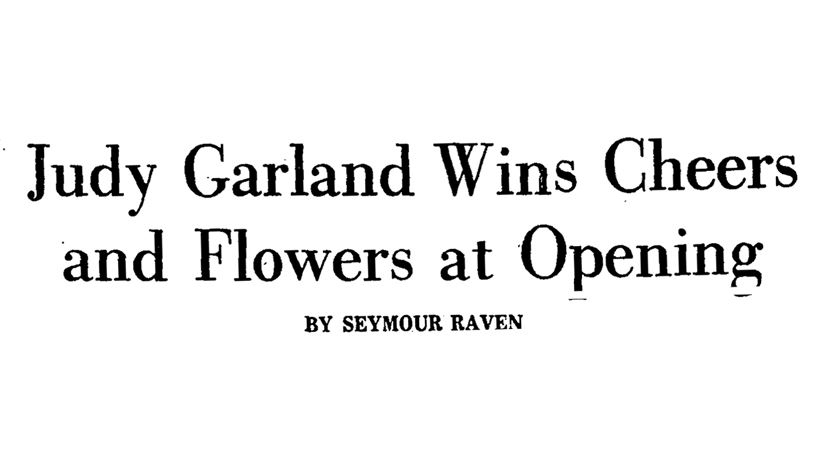
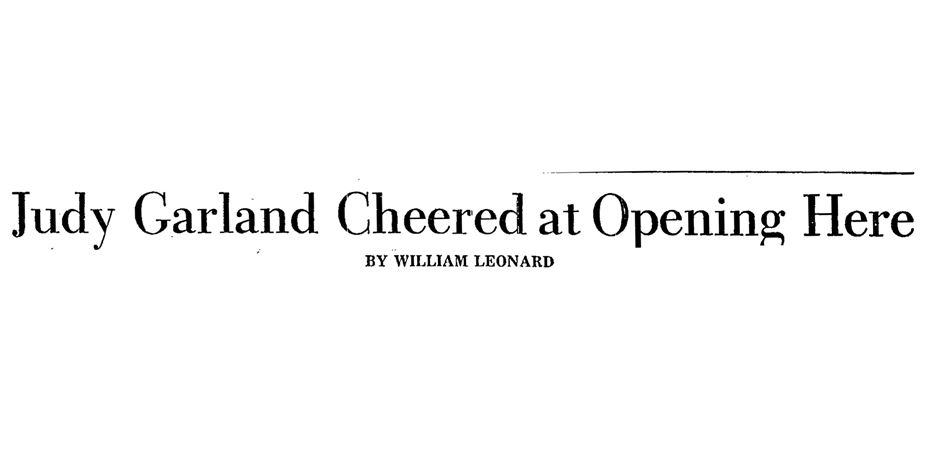
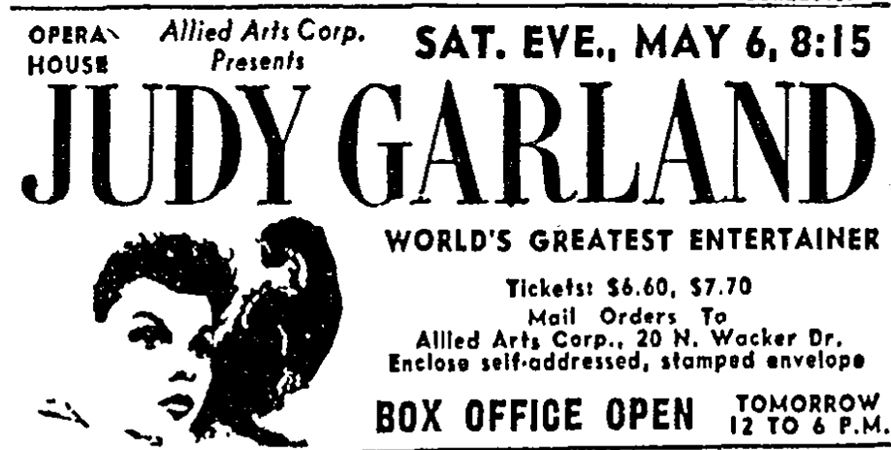
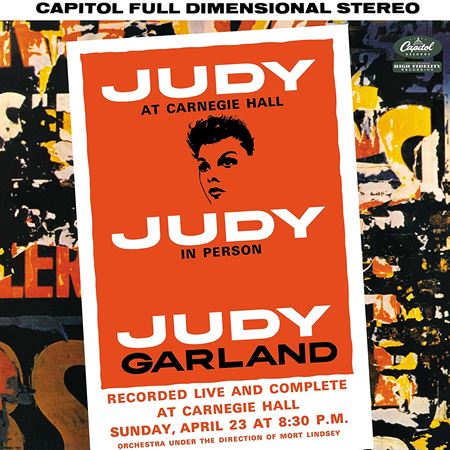
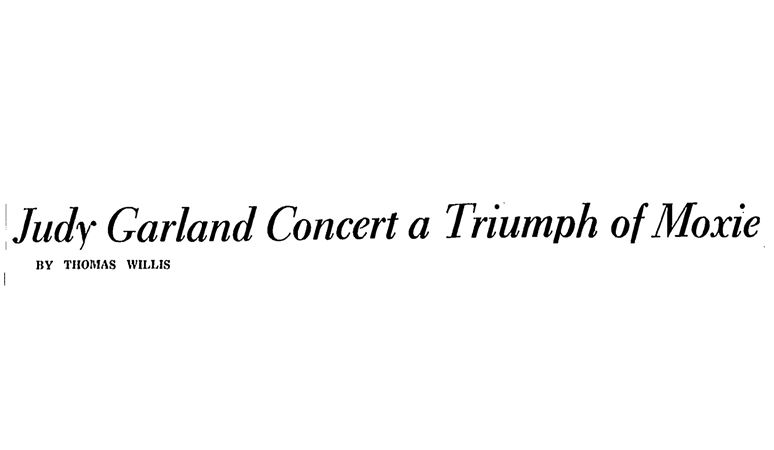

Under the auspices of Allied Arts, Garland was back in Chicago on two more occasions — both for performances at the new Arie Crown Theater at McCormick Place — on November 7, 1962, and May 7, 1965. “Audiences habitually regard her concerts as love feasts. This was no exception,” wrote Thomas Willis in the Chicago Tribune on November 8, 1962. “Through it all, the high-voltage personality operated full force.”
Judy Garland died in London on June 22, 1969, at the age of 47, but her legacy endures. She has been recognized for lifetime achievement from the Recording Academy, and she was the youngest recipient and the first woman to receive the Golden Globe Cecil B. DeMille Award, also for lifetime achievement. She received honorary Academy and Tony awards, a Golden Globe, two Grammy awards, two Academy and three Emmy award nominations, and two stars (one for acting, one for recording) on the Hollywood Walk of Fame. Six of her records have been inducted into the Grammy Hall of Fame, and the American Film Institute’s 100 Years . . . 100 Songs listed “Over the Rainbow” from The Wizard of Oz as the number-one movie song of all time, along with "The Man That Got Away" from A Star is Born (no. 11), "The Trolley Song“ and ”Have Yourself a Merry Little Christmas" from Meet Me in St. Louis (nos. 26 and 76), and "Get Happy" from Summer Stock (no. 61).
This article also appears here.



